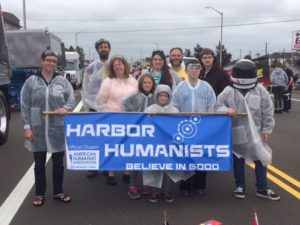How a Harvey LeBrun Grant Helped Our Small Chapter

Being a newly formed chapter of the American Humanist Association, Harbor Humanists spent most of our first meetings deliberating and deciding where we wanted to spend our time and energy. Our members felt strongly that education and outreach were critically important. We’re located in the small town of Hoquiam, Washington, and our members live in adjoining small towns. Very few secular, nonpolitical groups exist in our area so we aim to invite all freethinking residents to join us for social events, as well as fight discrimination and intolerance.
A short time after the Harbor Humanists chapter was formed, we learned about the Harvey LeBrun Chapter Grant program offered to AHA chapters each year. After taking a closer look at our group‘s interests, we decided to extend our outreach to kids in the community who might want an alternative to the annual summer church camps. Harbor Humanists is housed in a decommissioned church that held annual Vacation Bible Study camps. What better choice for us than to provide a summer science camp instead? We knew that if we got kids who are interested in science to join us, their parents might be interested in seeing what else we offer.
Our grant application was a request to help fund a one-week summer camp for kids eight to thirteen years old. We have several members who work in various scientific fields, so we could offer a wide range of topics for study. We also wanted to feed the students, as this is an economically depressed area where approximately 90 percent of students qualify for free or reduced lunch at school. We put together a syllabus for the camp, looked at background checks for adult volunteers through the Washington State Patrol, and worked up some marketing ideas to invite local kids to join us. Our adult volunteers numbered seven, including an epidemiologist, a retired high school science teacher, a marine biology intern, and a forest biologist.
We applied for a $500 grant—to go toward food and advertising the camp—and were shocked and very excited to be awarded $1,000. With the extra funds we were able to purchase a forensic mystery kit that would allow us to teach the kids about handwriting and fingerprint analysis, DNA extraction, pattern recognition, blood typing, hair and fiber analysis, and of course scientific and deductive reasoning.
In order to market our summer camp, we purchased 500 miniature magnifying glasses and printed 500 half-page flyers. We taped the glasses to the flyers and participated in a local Founders Day parade, handing the flyers out to kids along the parade route. We also held a Bunco fundraiser and a couple of open houses designed to introduce ourselves to the community. We handed out over 400 flyers and got great feedback from parents. We felt we should have enough interest to fill up our camp.
Unfortunately, when the time came for applications, we had only mild interest and no applications returned. We were very disappointed but not defeated, concluding that Harbor Humanists simply wasn’t a well-known group in the community and that we needed to do more outreach locally to remedy that. We also realized that our dates for the camp were at the end of summer vacation when many families were still traveling or concentrating on going back to school. Our next attempt would be a science camp during the following spring break when parents might not be traveling and would like a safe place for their children to be during the day.
In March of 2018 we began reaching out to the local community once again, this time to offer a spring break science camp. The program generated more interest and we received applications for seven campers. With the grant money and additional donations of approximately $400, we were able to provide two balanced meals plus a snack for each camper daily, plus a pizza party the closing day and a unique plantable pencil for completing the entire week of camp.
We would absolutely recommend this type of program to other AHA groups. We will be offering science camps again in the future and our hope is to continue to grow as a chapter through ongoing outreach and education opportunities.
